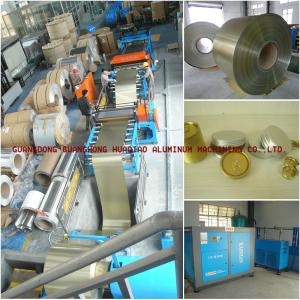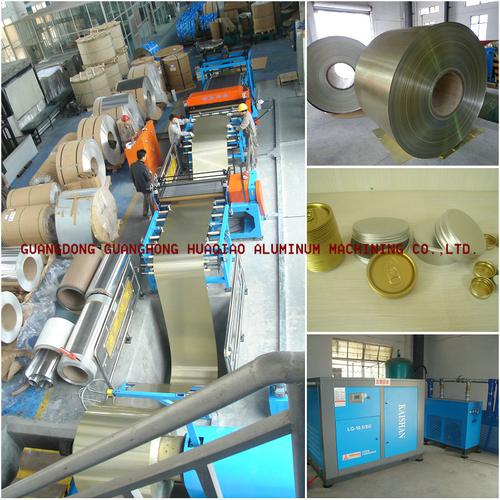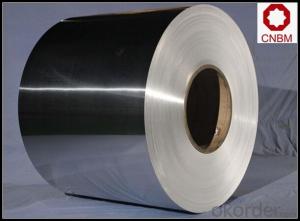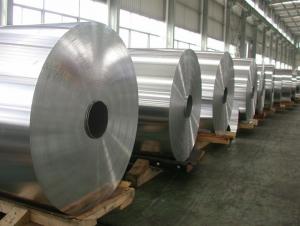China Aluminum Coil Can End Stock
- Loading Port:
- China Main Port
- Payment Terms:
- TT OR LC
- Min Order Qty:
- -
- Supply Capability:
- -
OKorder Service Pledge
OKorder Financial Service
You Might Also Like
Cans cover (ring) pre-coated plates
First, the raw materials
Aluminum lid and pull the main substrate of aluminum from the southwest andNanshan Aluminum, the use of aluminum-magnesium alloy 5182H19, 5052H19. Itsproducts in the normal substrates of manganese and magnesium components addedto increase the tensile strength and elongation. Han and the lotion by theGerman food-grade chrome HD agent, the United States PPG epoxy phenolicpackaging coatings, and high-end DOS oil
Second, applications
Division I professional production of DOS card and aluminum cans with a coatingfor cans of the lid and pull the coated aluminum is widely used in beverage,beer, rice pudding, tea, cigarettes, cans and other products packaging. U.S.imports of food ash using electrostatic spray wax, cut by large waves, transverseshear, longitudinal easily processed into the system covered the pre-coatedaluminum manufacturers. Depending on the system covers equipment can makeweight and volume of different specifications to meet customer requirements.
Third, the application prospect
Cans of food packaging as lightweight, unbreakable, easy to carry transportcharacteristics, cans packaged foods will gradually replace the glass packagingfood. As
Alloy & specification
Alloya | Coated panel,strip status | Status | Aluminum thicknessa t/mm | Aluminum Specificationa /mm | Aluminum coil specificationa /mm | ||
Width | length | width | Steeve Φ | ||||
5052、5182 | H46、H48、H49 | H18、H19、 H36、H38、H39 | 0.22≤t≤0.50 | 500~1600 | 500~4000 | 20~1600 | 300、350、 405、505 |
a.Other alloy, specification of material can be negotiated | |||||||
Aluminum thickness
Aluminum thickness | Thickness tolerance(±) |
>0.22~0.30 | 0.005 |
>0.30~0.50 | 0.008 |
Width and Length
Alloy | Aluminum panel&coil length tolerance/mm | Aluminum Panel & coil width tolerance/mm /mm | ||||
Pop top | Pop can cover | |||||
Length≤2000 | Length >2000 | width≤100 | width >100 | width≤1000 | width >1000 | |
5052 5182 | +1 0 | +2 0 | ±0.2
| +1.5 0 | +1.0 0 | +1.5 0 |
Dynamic features
Alloy | Status | thickness(t)/mm | Room temperature tensile test results | ||
Tensile strength Rm/MPa | non-proportional extension strengthRp0.2/MPa | elongationA50mm /% | |||
≥ | |||||
5052 | H36 | >0.22~0.30 | 255~305 | 200 | 2 |
>0.30~0.50 | 255~305 | 200 | 3 | ||
H18、H38 | >0.22~0.30 | 270 | 210 | 2 | |
>0.30~0.50 | 270 | 210 | 3 | ||
H19、H39 | >0.22~0.30 | 290 | 220 | 2 | |
>0.30~0.50 | 290 | 220 | 3 | ||
5182 | H36 | >0.22~0.30 | 265~340 | 270 | 3 |
>0.30~0.50 | 265~340 | 270 | 4 | ||
H18、H38 | >0.22~0.30 | 330 | 285 | 3 | |
>0.30~0.50 | 330 | 285 | 4 | ||
H19、H39 | >0.22~0.30 | 340 | 295 | 3 | |
>0.30~0.50 | 340 | 295 | 4 | ||
Coating function
Suppliershould ensure DOS oil of pop can cover is up to 5~10mg/m2/side, and coating surfaceshould be with even wax which is up to 40~100mg/m3/side
Food and packing industry pop can covercoating aluminum panels’ features:
Function | Coating weightg/m2 | Deviation of coating | T Bend | MEK | High temperature sterilization | S Resist-ance | Acid resista-nce | Adhe -sion | |
Pop can Cover | Outer coating | 3~6 | ≤10 | ≤2 | >50 | See Note.1 | - | - | 1 Grade |
Inner coating | 10~13 | ≤10 | ≤2 | - | See Note.1 | See Note.2 | See Note3 | 1 Grade | |
Pop can tab | 2 sides coating | 3~6 | ≤10 | ≤2 | >50 | See Note.1 | - | - | 1 Grade |
Note: 1 After121℃,30min distill,Internal and external coating without white, loss of light, peeling, and shedding. 2 After121℃,30min S corrosion,Internal and external coating without white, loss of light, peeling, and shedding. 3 After121℃,30min acid erosion,Internal and external coating without white, loss of light, peeling, and shedding. | |||||||||
The surface of the pop cans cover coatingdoes not allow defects such as air bubbles, scratches, missing coating,over-burning, oil spots, stains, streaks, color, piebald, roller printing,embossing, periodic prints, chemical liquid etc which impact users.
Each coil allowed a joint which does notallow loose layer or dislocation, the joint can only be overlapped, which needto make the mark in the end, and each batch coil of joint is not morethan 10% of the total number of coils.
Services
Supporting services: Offering semi-finishedproducts & OEM services
- Q: Are aluminum coils compatible with different welding methods?
- Different welding methods can be used with aluminum coils. Aluminum is a versatile metal that can be welded using techniques like gas tungsten arc welding (GTAW) and gas metal arc welding (GMAW). These methods are commonly used for welding aluminum coils because they produce high-quality welds. GTAW, also known as TIG welding, is particularly suitable for aluminum. It allows for precise control of heat input and produces excellent weld quality. TIG welding uses a non-consumable tungsten electrode and an inert gas like argon to protect the weld zone from contamination. GMAW, also known as MIG welding, is a faster process that uses a consumable wire electrode and a shielding gas to protect the weld pool. It is widely used in industrial applications due to its efficiency and ease of use. In addition to TIG and MIG welding, other methods like laser welding and friction stir welding can also be used for aluminum coils, depending on specific requirements. Proper preparation is crucial for successful welds. Cleaning and surface treatment of the aluminum coils are important to remove contaminants or oxide layers that could affect the welding process. Overall, different welding methods can be used with aluminum coils, and the choice depends on factors like desired weld quality, production requirements, and available skills and equipment.
- Q: Can aluminum coils be used for signage purposes?
- Signage purposes can indeed utilize aluminum coils. Aluminum, as a lightweight and versatile material, finds common use in the signage industry. It possesses exceptional resistance to corrosion, rendering it suitable for both indoor and outdoor applications. Aluminum coils are easily cut and molded into diverse shapes and sizes, enabling the creation of customized signage designs. Moreover, aluminum exhibits high durability and can endure harsh weather conditions, ensuring longevity for signage. Coils can be painted or coated with various finishes to achieve desired aesthetics, while simultaneously safeguarding against fading and scratching. Ultimately, aluminum coils remain a favored choice for signage due to their versatility, durability, and aesthetic appeal.
- Q: What maintenance is required for aluminum coils?
- To ensure efficient performance and longevity, aluminum coils require regular cleaning and inspection. Here are several specific maintenance guidelines to follow: 1. Cleanliness: It is crucial to regularly clean the aluminum coils to eliminate any dirt, dust, or debris that may accumulate on the surface. Utilize a soft brush or a vacuum cleaner with a brush attachment to gently remove loose particles. Avoid using abrasive cleaners or brushes that could potentially scratch or damage the aluminum. 2. Inspection: It is important to periodically inspect the aluminum coils for any signs of damage or wear. Check for bent or dented fins, as these can hinder airflow and decrease the efficiency of the coils. Additionally, be on the lookout for indications of corrosion, such as discoloration or pitting, as this can impact the coils' performance and lifespan. 3. Coil Protection: Applying a protective coating or sealant to the aluminum coils can safeguard them against corrosion and damage caused by moisture, chemicals, or harsh environmental conditions. This preventative measure can significantly extend the lifespan of the coils and maintain their optimal performance. 4. Lubrication: If the aluminum coils are part of a mechanical system, such as an HVAC unit, ensure that all moving parts are adequately lubricated. This will minimize friction and wear on the coils, thus enhancing their efficiency and preventing premature failure. 5. Professional Maintenance: It is advisable to schedule regular professional maintenance for your aluminum coils, particularly if they are part of a larger system. HVAC technicians or specialized coil cleaning services can conduct a thorough inspection, cleaning, and maintenance to ensure peak performance and identify any potential issues early on. By adhering to these maintenance practices, you can effectively prolong the lifespan of your aluminum coils, enhance their efficiency, and avoid costly repairs or replacements.
- Q: How are aluminum coils used in the production of automotive heat shields?
- Aluminum coils play a crucial role in the production of automotive heat shields. Heat shields are essential components in vehicles designed to protect various parts from excessive heat generated by the engine, exhaust system, or other heat sources. These shields are typically made from lightweight and heat-resistant materials, and aluminum coils are a popular choice due to their excellent thermal conductivity, durability, and corrosion resistance. In the production process, aluminum coils are first unwound and then cut into sheets of the desired size for the heat shields. These sheets are then formed into specific shapes using various techniques such as stamping, bending, or deep drawing. The ability of aluminum to be easily shaped and molded makes it ideal for creating heat shields with complex geometries, ensuring a precise fit in the vehicle. Once the desired shape is achieved, the aluminum sheets are often treated with a surface coating to enhance their heat resistance and protect against corrosion. This coating can be in the form of a ceramic or metallic layer, providing an additional barrier against extreme temperatures. The formed and coated aluminum sheets are then typically layered with other insulating materials, such as ceramic fibers or laminated films, to further enhance the heat shield's performance. These additional layers help to reduce heat transfer by reflecting or absorbing the heat energy, thereby protecting the surrounding components from potential damage or overheating. Finally, the assembled heat shields are mounted in specific locations within the vehicle, such as around the exhaust system or near the engine, using fasteners or adhesive techniques. The lightweight nature of aluminum coils ensures that the heat shields do not add unnecessary weight to the vehicle, which is crucial for maintaining fuel efficiency and overall performance. In conclusion, aluminum coils are used extensively in the production of automotive heat shields due to their excellent thermal conductivity, durability, and corrosion resistance. Their ability to be easily shaped and molded, combined with surface coatings and additional insulating layers, ensures effective heat insulation and protection for various vehicle components.
- Q: Can aluminum coils be used in the production of electronic components?
- Yes, aluminum coils can be used in the production of electronic components. Aluminum is a commonly used material due to its lightweight, conductivity, and corrosion resistance properties. It is often used in electronic devices such as capacitors, inductors, and transformers.
- Q: How are aluminum coils transported and delivered?
- Aluminum coils have various transportation options, including road, rail, and sea. The choice of transportation depends on factors like distance, quantity, and urgency. For short distances, road transportation is common. Special trucks with flatbed trailers or coil carriers are used to securely transport the coils. These trucks have features like adjustable cradles or coil pads to prevent shifting during transit. Longer distances often involve rail transportation. Railcars can accommodate many coils depending on their size and weight. Rail transport is cost-effective and environmentally friendly for long-haul journeys. When coils need to be transported overseas or to another continent, sea transportation is preferred. Shipping containers protect the coils from potential damage. Cargo ships have the capacity and stability for long-distance transportation. Regardless of the mode of transportation, it is vital to handle aluminum coils carefully to prevent damage. Coils are protected from excessive vibration, impact, and adverse weather conditions. Tracking systems are used to monitor the location and condition of the coils during transportation. Overall, the transportation and delivery of aluminum coils require a well-coordinated logistics network to ensure timely and efficient delivery while minimizing the risk of damage.
- Q: Can aluminum coils be used in automotive suspension systems?
- Automotive suspension systems can utilize aluminum coils. Aluminum, a lightweight and sturdy material, provides numerous advantages for suspension components. Its high strength-to-weight ratio allows it to handle heavy loads without burdening the vehicle with unnecessary weight. This can enhance fuel efficiency and overall performance. Furthermore, aluminum is resistant to corrosion, making it particularly valuable for automotive suspension systems exposed to harsh weather conditions and road debris. By incorporating aluminum coils, manufacturers can ensure that suspension components have a longer lifespan and require less maintenance. In addition, aluminum coils possess superior heat absorption and dissipation capabilities compared to materials like steel. This aids in preventing overheating and mitigating the risk of suspension failure, especially during intense driving conditions or off-road usage. However, it is important to note that the use of aluminum coils in automotive suspension systems may entail certain compromises. Although aluminum is lighter and more resistant to corrosion, it may not be as strong as steel. Therefore, manufacturers must meticulously design and engineer the suspension system to ensure it can withstand necessary loads and provide sufficient support and stability for the vehicle. In summary, aluminum coils can be effectively employed in automotive suspension systems, offering benefits such as lightweight construction, corrosion resistance, and efficient heat dissipation. Nevertheless, manufacturers must carefully consider the specific requirements and trade-offs associated with aluminum usage in suspension components to ensure optimal performance and safety.
- Q: Can aluminum coils be used for electrical applications?
- Yes, aluminum coils can be used for electrical applications. Aluminum is a widely used material in the electrical industry due to its excellent conductivity, lightweight properties, and corrosion resistance. Aluminum coils are commonly used in various electrical applications such as transformers, motors, generators, and coils for inductors and solenoids. They offer advantages such as high thermal conductivity and low eddy current losses, making them efficient in transferring and distributing electrical power. Additionally, aluminum coils are cost-effective compared to copper coils, making them a preferred choice for many electrical applications. However, it is important to note that aluminum has a lower electrical conductivity compared to copper, so the coil design and dimensions may need to be adjusted accordingly to ensure optimal performance.
- Q: Can aluminum coils be used for nameplates and labels?
- Yes, aluminum coils can be used for nameplates and labels. Aluminum is a versatile and durable material that can be easily shaped, engraved, or printed on. It is commonly used for manufacturing nameplates and labels due to its resistance to corrosion, lightweight nature, and ability to withstand harsh environments.
- Q: This question asks about the impact of aluminum coils on food quality, considering possible effects on taste, safety, and preservation.
- <p>Aluminum coils, when used in cooking or food packaging, can potentially affect the quality of food. If aluminum leaches into the food, it may alter the taste and could pose health risks due to aluminum's neurotoxic properties. However, modern food-grade aluminum coils are coated or anodized to prevent such leaching, ensuring food safety. They are also used in heat transfer for cooking, which can improve the efficiency and evenness of cooking, thus enhancing food quality. It's crucial to use high-quality, food-safe aluminum coils to avoid any negative impact on food quality and safety.</p>
Send your message to us
China Aluminum Coil Can End Stock
- Loading Port:
- China Main Port
- Payment Terms:
- TT OR LC
- Min Order Qty:
- -
- Supply Capability:
- -
OKorder Service Pledge
OKorder Financial Service
Similar products
Hot products
Hot Searches
Related keywords
























